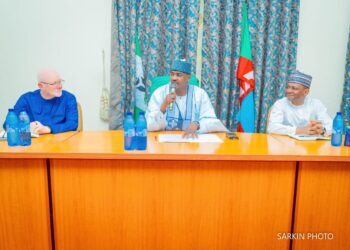The Coordinating Minister of Health and Social Welfare, Prof. Muhammad Ali Pate, has said that President Bola Tinubu led administration is spearheading transformative reforms that are reshaping the nation’s healthcare landscape.
Pate, who was named one of the 100 Most Influential Africans, disclosed this in an interview with the News Agency of Nigeria (NAN) on Friday in Abuja.
He was reacting to his inclusion in the prestigious list released by New African magazine.
NAN reports the 2024 New African magazine’s list of the 100 Most Influential Africans includes individuals from 29 countries, with Nigeria having the highest representation, followed by Kenya.
The magazine’s editor described the list as a “large family get-together,” reflecting the Ubuntu philosophy of “I am because we are”, emphasising unity in a polarised world.
This year’s list highlights the growing significance of Artificial Intelligence (AI) and climate action, featuring experts addressing ethical concerns and biases in AI systems.
The minister recounted how he turned down an appointment as CEO of Gavi, the Vaccine Alliance, chosing to return home to lead Nigeria’s health sector, a decision that is already yielding remarkable results.
“At the heart of these reforms is the National Health Sector Renewal Investment Initiative (NHSRII).
“The initiative replaces the previously fragmented health system with a cohesive “one vision – one conversation, one budget, one report” approach.
“This framework has not only united federal, state, and local governments but also galvanised private and international partnerships.
It is also mobilising an unprecedented three billion dollars in external funding and 20 billion dollars in domestic investments within four years, “ he said.
He said that the impact of NHSRII was most evident in the revitalisation of Nigeria’s primary healthcare system.
Pate said that Nigeria had become one of the first countries to receive over one million doses of the R21/Matrix-M malaria vaccine under his leadership.
He described the feat as a groundbreaking development in the fight against one of the nation’s deadliest diseases.
The minister’s influence extends beyond Nigeria. As the West and Central Africa representative on the Global Fund Board (2024–2026), he advocated for increased funding for Africa’s health systems.
The selection of Nigeria to host the 5th Global High-Level Conference on Antimicrobial Resistance (AMR) in 2026 underscores the country’s growing role in addressing global health challenges.
NAN reports that facilities once plagued by shortages of medical supplies and personnel are now equipped to provide essential services.
For instance, the Karmo Primary Healthcare Centre in the Federal Capital Territory now records a significant increase in antenatal visits, with women attesting to the availability of quality care.
“For the first time, I feel safe delivering my baby at this facility,” said Mrs Mariamu Yusuf, a mother of three.
Meanwhile, experts believe that Pate’s reforms are laying the foundation for one of Africa’s most accountable health systems.
Dr Sarah Eke, a public health consultant, said that what made Pate’s approach unique was its focus on measurable results and sustainability.
“As Nigeria reaps the benefits of a unified health system, the question remains whether these reforms can be sustained beyond his tenure.
“However, for now, communities across Nigeria are already experiencing the transformative power of an integrated healthcare framework. Proving that bold leadership and strategic partnerships can, indeed, change lives,” Eke said.
NAN recalls that key achievements of NHSRII Under Pate’s Leadership: were mobilising 23 billion dollars in funding, rerevitalising over 5,000 primary healthcare centres, and spearheading the deployment of the R21/Matrix-M malaria vaccine.
Meanwhile, some health stakeholders explained that Pate’s story was not just about reforms, but also about hope, resilience, and a vision for a healthier Africa.
The New African magazine’s 2024 issue of the 100 Most Influential Africans highlights individuals making significant impacts across various sectors, including politics, business, civil society, science, academia, creative arts, and sports.
The publication, established in 1966 and distributed in over 100 countries, provides an African perspective to global news and profiles these influential figures in detail.
The list reflects diverse contributions shaping Africa’s future on the global stage.(NAN)











